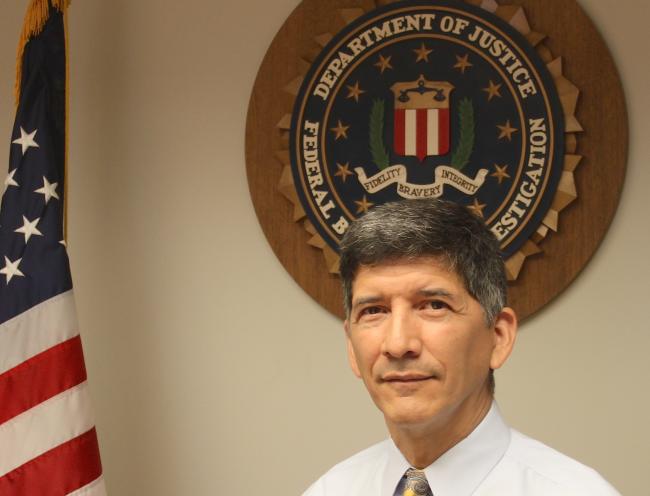Getting to know the new Special Agent in Charge of the FBI's Seattle branch
Frank Montoya Jr., who has been with the FBI for 23 years, recently took over as the Special Agent in Charge of the bureau’s Seattle division.
Mon, 08/11/2014
By Tim Clifford
“The FBI is celebrating its one hundred anniversary, its presence in Seattle at one hundred years this year, and when you think about some of the things that have transpired over that past century it’s pretty amazing where we find ourselves today. Not just as an organization but our place in the community. It will be pretty interesting where we find ourselves moving forward.”
This is how Frank Montoya, Jr., the new Special Agent in Charge (SAC) of the Seattle branch of the FBI, opens up a small press conference held inside the branch’s headquarters on 3rd Ave. in downtown Seattle.
A graduate from Brigham Young University and former Army Infantry officer, Montoya began his career with the FBI in their San Antonio division 23 years ago. Working in violent crimes, cyber-crimes, and drug units Montoya also established and led the San Antonio division’s fugitive task force. Working in many divisions throughout the United States, notably leading the investigations into the Edward Snowden leaks, Montoya comes to Seattle fresh off two years of being the SAC in the FBI’s Honolulu division.
“I see this as my culminating experience in the Federal Government” he says of his Seattle assignment.
It would be interesting to hear in posterity if the issues that Montoya himself brings up do indeed turn out to be the defining challenges of his time in Seattle. Cyber-crimes, violent crimes, white collar crime, and of course, the legalization of marijuana become the focal points of the conversations between Montoya and the reporters in attendance.
One major and timely issue that both the city of Seattle and the federal government are facing is the legalization of marijuana and the resultant laws, regulations and enforcement that have yet to be fully realized.
“What will that mean for us in the future? Will it make our jobs better, easier or will it make our challenges harder?” asked Montoya.
“When we call it a gateway drug there are reasons why we do it, because of what it can lead to. But at the same time we are seeing a mindset change in our culture and it’s not just about drug uses, it’s in any number of areas” explained Montoya.
Specific concerns to Montoya regarding legalization was dealing with the demand for higher THC levels and the impact of more potent legalized cannabis.
“Where do we draw the lines? What I mean by that is how far do we go into a culture change that allows whatever we feel like doing. We’re a nation that is based on the rule of law, that has existed and thrived and flourished for as long as it has because we have the rule of law” continued Montoya.
Seguing from the issues of legalized marijuana to the violent crimes and gang activity related to drug trafficking, it was the Mexican drug cartels that were mentioned prominently.
“A big challenge for us is the Mexican drug trafficking organizations, this is clearly a national problem but I think it is acute here” said Montoya.
“What we’re seeing is no matter who the gang is, whether it’s a white supremacist activity, or it’s an ethnic youth gang, or its general users, the fact of the matter is all of them are being supplied and kept in business by the Mexican drug trafficking organizations right now, and it’s not just one kind of drug but all kinds of drugs.”
When asked about the collection of meta data by the United States government, specifically as it relates to average U.S. citizen Montoya baulked at the implication of an invasion of privacy.
“Well, you know that’s a qualified statement because individuals who are targeted by us for investigation because they may be acting as agents for a foreign power, in preparation for a terrorist activity, or to commit other kinds of criminal acts, we’re going to go after them” he responded.
While not denying that the collection of meta data does occur he made sure to clarify that listening to phone calls and reading emails only occurs when there is a threat.
“We are going to get authorized warrants from district court judges, and in the instance of FISA (Foreign Intelligence Surveillance Court) those are still district court judges. We are not reading emails or listening to telephone calls of your average American, we just don’t do that” he clarified.
“I’m invested in protecting privacy as much as anyone else is” Montoya concluded.
Montoya begins his time in Seattle following a controversial resignation from his predecessor, former SAC of Seattle Laura Laughlin. After filing a lawsuit in Washington, D.C. alleging sexual discrimination by the bureau in 2011, Laughlin abruptly retired in February after 9 years in her position.
But Montoya seems to express a genuine admiration for the Pacific Northwest and repeatedly mentioned his excitement to work in the area.
“It was 30 years ago, this month….last month that I first became acquainted with this area when I attended ROTC advanced camp in Fort Lewis, or what was then known as Fort Lewis” he reminisces to all in attendance.
“ It was my intention way back then to always get back here and finally I did.”


